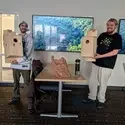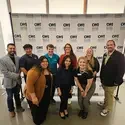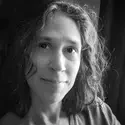As a member of the CWI mathematics department it likely comes as no surprise that I majored in math in college and graduate school. When I meet new people the assumption that they make upon learning what I do for a living is probably not unlike the reaction that dentists get. In other words, “Wow, you must be really smart and kind of a sadist.” They also assume that studying math is the fulfillment of a lifelong obsession with math, that I really want to hear their horror stories about math, and that I teach because it is literally the only thing one can do with a math degree.
The truth is that growing up I didn’t have strong feelings one way or another about math. I was terrible at the quizzes in grade school where you had to do 100 multiplication problems in 30 seconds (I don’t actually remember how long we were given but it was not much time). My second grade math teacher actually told my mother that I’d never be good at math. My mother didn’t tell me this until I’d already completed my master’s degree in the topic. Can you imagine how different things might have been if anyone other than that teacher had believed that I was at my mathematical peak when I was seven? Later, in junior high, I was not picked to be one of the kids that started learning algebra in eighth grade.
My point in discussing this is to illustrate that whether or not some people are inherently capable at math, I would not have been automatically labeled as someone who was. I was a smart but unmotivated student who did not shine in any particular academic area. I got by. My saving grace was that nobody ever told me that I was bad at math or science or English. They weren’t falling over themselves to say that I was good at any of those things either, mind you.
So, how on earth did I get from the academic equivalent of a pair of khaki pants to being a mathematician? In high school I had an English teacher that was so offended by a contribution I made in class one day when we were looking for examples of symbolism in an Emily Dickenson poem that my grades suffered from that day on until I was removed from honors English and re-placed into the track below that. Because my contribution was in no way, shape, or form actually offensive (it really truly wasn’t) yet so much changed for me as a result of it (not the least suddenly finding myself attending a class where I knew no one), I started to appreciate my math classes a bit more. In math, a correct answer was correct no matter who gave it. It wasn’t subject to the instructor’s opinion and if someone else had the same answer I didn’t have to scramble to come up with a new and more interesting one. If you think about it, that’s pretty terrific. I still loved to read, write, and study history but I did start to see my math class as a place of reduced vulnerability. It also helped that the painfully corny jokes that my math teachers were prone to make actually made me laugh. I suspected that these might be my people.
In college I declared myself a math major but took as many art classes as I could fit in my schedule so that both sides of my brain could express their creativity. I started at a community college (hooray community colleges!) and transferred to a small liberal arts college to finish my degree.
I will always be grateful to that thin-skinned meanie of an English teacher because she helped steer me toward a field that has rewarded me over and over throughout the years. What is of utmost importance to understand, though, is that I did not allow her actions to also steer me away from a love of reading and writing any more than my mother let that second grade teacher convince her (and by extension, me) that I was a mathematical never-ran. For those of you reading this who are harboring wounds from a past math (or some other subject) teacher that made you feel that you were at your limit, know that you can always reboot your expectations about yourself. CWI is a great place for a fresh start academically. We’ll meet you where you are and work to get you where you should be.











